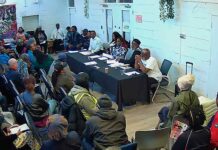
Luna Williams, political correspondent for the Immigration Advice Service, says the Windrush generation and their descendants are not the only people suffering from the ‘hostile environment’ which also afflicts asylum seekers
Asylum seekers are some of the most physically, psychologically and emotionally vulnerable people on the planet. Having fled their homes in search of safety from persecution, violence and torture, many of those attempting to claim refuge in the UK have already experienced unimaginable trauma by the time they reach the UK.
As a result, Britain’s asylum process is supposedly designed to understand this. According to official Home Office guidance, interviewing caseworkers are required to create a “supportive and secure environment” for claimants, in which they can present their case while being treated with “respect and humanity, dignity and fairness”.
The asylum interview – a central part of the process for seeking refuge in the UK – is often the only chance a person has to provide their testimony and give evidence to support their case. The Home Office itself acknowledges this, saying that the testimony provided by the claimant during the interview is often “the only substantive evidence” used when deciding to grant an asylum claim.
The weight of this interview means that it is vital that interviewees are given the time and space to comfortably tell their stories, and that they are treated fairly and compassionately when doing this.
Unfortunately, though, recent investigations into the asylum interview show that this is not always the case. According to a report released this Spring by Freedom From Torture, interviewing caseworkers are consistently failing to provide a fair or compassionate environment for claimants.
They were consistently found to apply prejudiced and premeditated decisions to cases, many of which were tied to racial discrimination and a so-called “culture of disbelief”. This culture has infiltrated many areas of immigration and domestic laws in the UK and is born out of Theresa May’s infamous “hostile environment policy”.
This policy has sparked controversy since its implementation in 2012, when May was home secretary. Working off the basis that the UK should be made into a “really hostile environment” for “illegal” migrants (in this hopes that this encourages them to “voluntarily leave”) the hostile environment policy has resulted in wide-spread, cross-sector discrimination.
One of its operations – coined “Operation Vaken” – involved deploying “Go Home” vans in areas with large Black and minority-ethnic communities. Another encouraged landlords, hospitals and the police to vet and report those seeking their services to immigration enforcement. This Act resulted in various cases of racial discrimination and inequality, with one survey by JCWI finding that a huge proportion of landlords would avoid negotiating with potential tenants who had a “foreign-sounding” name or accent.
The hostile environment policy reached its peak in the Summer of 2018, when hundreds of Windrush-generation citizens had their rights stripped from them because they could not prove their citizenship under newly-imposed laws.
This happened decades after they and their predecessors were invited to the UK by the British government and promised citizenship on the condition that they helped take on vital jobs after the war. The Home Office, having later destroyed and lost their identification documents, began threatening the same people with deportation, stripping them of their right to work and reside in the UK under new laws imposed by the hostile environment policy.
Although the policy was denounced in the wake of this scandal, it evidently continues to influence the behaviour of caseworkers from the Home Office. In Freedom From Torture’s report, it was found that victims of torture seeking refuge in the UK were consistently treated with disbelief. Much of this tied into prejudgements based on ethnicity and nationality.
Following George Floyd’s murder in the US, systemic racism has been pushed to the forefront of the public agenda, with a spotlight now placed on UK law.
At the end of 2018, a report was released by the UN that looked into the presence of overt and covert forms of racism, racial discrimination and inequality in the UK. Its findings showed black, Asian and other minority-ethnic communities to be disadvantaged in almost every area of British life, from education to criminal justice. What’s more, the rapporteur noted that the continued presence of hostile immigration policies was a huge factor in this; both migrant and British people who are non-white suffer discrimination based on their race as hostility becomes the default reaction for many service providers and supportive staff. When this is placed in the context of the asylum interview this is deeply concerning.
Home Office caseworkers have a responsibility to approach vulnerable people in a kind and reasonable way, without prejudice or prejudgement. The stakes of this testimony are especially high for victims of torture and violence; if their claim is unfairly refused, they risk being returned to a country where their life is in direct danger. If they are forced to appeal an unfair decision, they must continue to live their lives in limbo, without the right to work or integrate fully into UK life. This can have incredibly damaging effects, and places claimants at risk of retraumatisation.
During the height of social distancing measures, most asylum interviews have been suspended, postponed or cancelled, effectively paralysing ongoing asylum claims and leaving claimants in a legal grey area.
As the UK begins to salvage some sense of normality in a post-Covid-19 world, and interviews start to resume, we must consider how our immigration laws can be restructured to facilitate a positive change.
Systemic racism and hostile policies have no place in our asylum system, and they must be called out and tackled where they are exposed.
The Immigration Advice Service , an immigration law firm, provides legal aid to asylum seekers and trafficking victims in the UK, Ireland, and the US




